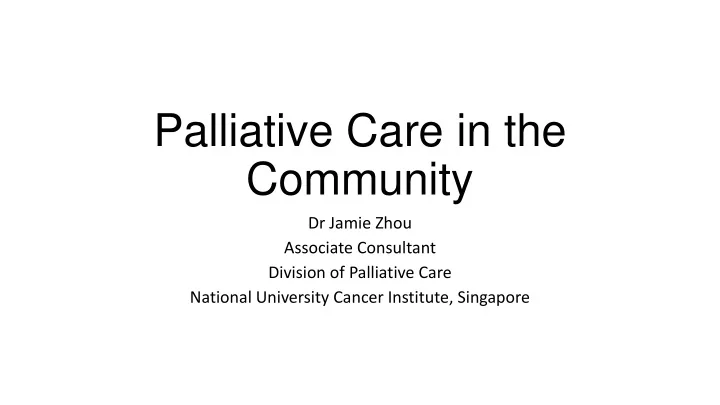

Palliative Care in the Community Dr Jamie Zhou Associate Consultant Division of Palliative Care National University Cancer Institute, Singapore
Topics covered • Palliative Care Services in Singapore • National Standards and Vision • Commonly used drugs
Palliative Care Services in Singapore • Hospital-based: all major hospitals • Community hospitals: St Luke’s, AMKCH, St Andrew’s CH • Coming up… Outram , Woodlands, Alex Campus… • Inpatient hospices: Dover Park, Assisi, St Joseph’s, Bright Vision • Home hospice care: Refer to Referral form • Day hospice care: HCA and Assisi
I am a GP. Can I refer my patient to a home hospice care service?
Things to consider before referring to home hospice care: • Preferable for primary doctor to refer • Is there a life-limiting illness? • Prognosis? • Needs? (How can home hospice care add value?) • Have the diagnosis, prognosis and goals of care been discussed with patient/family?
How to introduce home hospice care? • Value-add : symptoms, ‘troubleshoot at home’, 24hr/7 days hotline, especially if want to stay home as much as possible • Free service , means testing done for all (hospice gets funded through govt and charity) • Visit frequency : according to needs • Nurse-led , doctors available • Equipment loan • Referral to inpatient hospice
Filling in the referral form • Correct address (may be different from NRIC) • Spokesperson’s contact number • Fill in all the blanks to the best of your ability • Pay attention to prognosis • Explain diagnosis and prognosis to patient/family • Medical history and active issues very important
National Standards and Vision
Year 2010: Singapore ranked 18 th in Quality of Death
National Strategy for Palliative Care
National Strategy for Palliative Care Ensure that all healthcare professionals have a palliative care approach to the care of patients with non-complex end-of-life needs.
Palliative Care Enhancements in the Pipeline: Mr Chee Hong Tat (CNA 15 th Feb 2017) • Speaking to reporters on the sidelines of a visit to Assisi Hospice on Wednesday (Feb 15), Minister of State for Health Chee Hong Tat said palliative care will become increasingly important as the nation faces an ageing population. • “We’re mindful that as we look at how to transform our healthcare system, we want to move away not only from acute hospital services but towards more community care and long-term care ,” he said, adding that more details will be announced at the Ministry of Health’s Committee of Supply session.
MOH plans for 2020 • Increase public awareness/Grief and Bereavement support: 1 st SHC Community Engagement and Communications Steering Committee • Advance Care Planning: expand to primary settings and SOCs • Quality Improvement Programme for palliative care providers to ensure high standards • 232 inpatient hospice beds now 360 in 2020 • 5500 home care places per year now 6000 in 2020
How many Palliative Care Specialists in Singapore? • Real and Fake numbers… • Fake numbers: 57 as of 2016 (including grandfathers: 20% of time in pall. Therefore includes oncologists and haematologists) • Real numbers: 39 FTE
Types of Palliative Care Providers • Basic • MO/Resident • Internal Medicine or Family Physicians without GDPM or minimal pall experience • Intermediate • Resident Physician/Registrars/ Trainees in Palliative Medicine • Internal Medicine or Family physician with GDPM and substantial pall experience • Specialist • Palliative Medicine Specialists
Post-graduate Training and Education • 2017/2018 Graduate Diploma in Palliative Medicine: 12 months part- time • Open for online applications • Closing date 31 st May 2017 • 33 rd Post-Graduate Course in Palliative Medicine: 3-days • Open until 5 th April • Course from 26-28 th April 2017 • 12 CME points
Common Drugs
Common Drugs
Community Engagement Ask the EXPERTS in the Community…
Recommend
More recommend